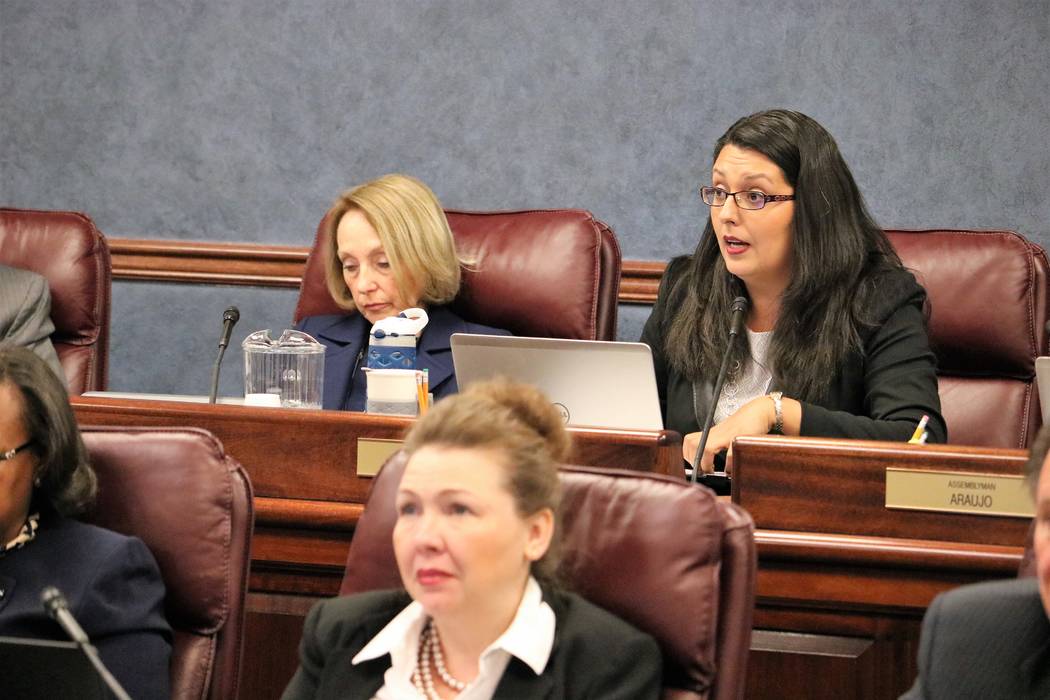Nevada attorney general files lawsuit over ERA
After the state of Virginia’s vote to become the 38th and final state needed to ratify the Equal Rights Amendment (ERA) last month, Nevada Attorney General Aaron D. Ford filed a lawsuit in late January to ensure the amendment is added to the U.S. Constitution, which would guarantee equal rights for all women, according to a news release issued from Ford’s office.
Virginia Attorney General Mark R. Herring and Illinois Attorney General Kwame Raoul both joined Ford in filing what’s referred to as a “landmark civil rights lawsuit.”
As stated in their complaint, the attorneys general asked the court to compel the U.S. Archivist to do its statutory duty by recognizing the states’ ratification of the Equal Rights Amendment.
The Equal Rights Amendment states in part, that “equality of all rights under the law shall not be denied or abridged by the United States or by any state on account of sex.”
Support on both sides
Originally introduced in 1923, the Equal Rights Amendment was adopted by Congress in 1972 with broad, bipartisan support.
Under the leadership of Senator Patricia Spearman, Nevada ratified the Equal Rights Amendment on March 21, 2017, when Ford was Senate majority leader, the news release stated.
That action was followed up when Illinois ratified the ERA back in 2018.
Under the Equal Rights Amendment, the U.S. Constitution would provide an explicit guarantee of protection against discrimination based on gender.
Once those protections are enshrined in the Constitution, they cannot be changed as easily as other laws.
Additionally, the Equal Rights Amendment would provide clear judicial standards for deciding cases involving gender discrimination, according to Ford.
“Women have always been endowed with equal rights, even though our country has wrongly failed to recognize them,” Ford said. “These rights are entitled to their rightful place in the Constitution, and I am committed to ensuring they are permanently written into our nation’s history and its future. Advancing civil rights is one of my administration’s main areas of focus. The gravity of this movement should not be underplayed. Today we are advocating for women’s rights here in Nevada and all over the country, and we are taking an essential stride towards inclusivity.”
As stated in the complaint, the attorneys general argue that under Article V, a proposed constitutional amendment automatically becomes valid to all intents and purposes, as part of the Constitution, as soon as it is ratified by the Legislature of three fourths of the several states.
The complaint further argues that the U.S. Archivist does not have any discretionary authority over which amendments are added to the Constitution, Ford’s release noted.
The complaint also explains why the Equal Rights Amendment remains valid.
As the complaint states, “Article V does not empower Congress to dictate when a state may consider, much less ratify, a proposed amendment,” and “nothing in Article V suggests, much less clearly requires, that states take action on proposed constitutional amendments within any particular amount of time.”
Additionally, the complaint explains that states have no power to rescind prior to ratification.
Additional support
Senator Spearman, chief sponsor of Nevada’s Equal Rights Amendment resolution, meanwhile, stated that throughout history, those born in privilege have tried to deny equality to those living in the margins and want us to justify our fight for equality.
“It’s taken 100 years, we got tired, but didn’t quit; some maligned our motives, tried to minimize our fight for equality, but we didn’t give up,” she said. “Virginia’s historic vote is another example of equality breaking out around the world. We celebrate because heroes didn’t quit. We are standing on the shoulders of these great people and making a down payment on the debt we owe them. The Equal Rights Amendment is about equality period.”
Nevada Senator Jacky Rosen, meanwhile added that in 2017, Nevada reached an incredible milestone in advancing women’s rights.
“Now that Virginia has joined Nevada and 36 other states in ratifying the Equal Rights Amendment, the amendment must be allowed to take effect,” she said. “It is far past time for the Equal Rights Amendment to become part of the Constitution. I applaud Nevada’s governor and attorney general for joining other states in bringing this fight to the judiciary. While more work lies ahead, we should pause to celebrate how far we have come and that we are one step closer to achieving full gender equality.”
Enshrining equality
Nevada Congresswoman Dina Titus noted that the Equal Rights Amendment should become the 28th Amendment to the U.S. Constitution.
“Ratifying the ERA is ultimately about enshrining equality in our founding document and making clear that gender discrimination has no place in this country,” Titus said. “Nevada is helping to lead the fight for women’s empowerment and I’m grateful to Attorney General Ford for standing up for what is right.”
Nevada Representative Susie Lee noted that there is no expiration date on equality.
“Nevada did its part to protect equality regardless of sex, by ratifying the Equal Rights Amendment in 2017,” Lee said. “I’m proud of State Senator Pat Spearman and the countless others who fought to make ratification a reality in Nevada, but the fight at the national level is far from over. As Virginia became the 38th state to approve the Equal Rights Amendment, the time has never been as critical as now to keep the momentum alive. I applaud Attorney General Aaron Ford in joining this lawsuit to ensure the U.S. Archivist ratifies the Equal Rights Amendment. Americans have spoken. Ratify the Equal Rights Amendment now.”

















